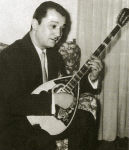
The bouzouki is a musical instrument popular in Greece. It is a member of the long-necked lute family, with a round body with a flat top and a long neck with a fretted fingerboard. It has steel strings and is played with a plectrum producing a sharp metallic sound, reminiscent of a mandolin but pitched lower. It is the precursor to the Irish bouzouki, an instrument derived from the Greek bouzouki that is popular in Celtic, English, and North American folk music. There are two main types of Greek bouzouki: the trichordo (three-course) has three pairs of strings and the tetrachordo (four-course) has four pairs of strings. The instrument was brought to Greece in the early 1900s by Greek refugees from Anatolia, and quickly became the central instrument to the rebetiko genre and its music branches. It is now an important element of modern Laïko pop Greek music.
The music of Greece is as diverse and celebrated as its history. Greek music separates into two parts: Greek traditional music and Byzantine music. These compositions have existed for millennia: they originated in the Byzantine period and Greek antiquity; there is a continuous development which appears in the language, the rhythm, the structure and the melody. Music is a significant aspect of Hellenic culture, both within Greece and in the diaspora.

The vast majority of the inhabitants of the United States are immigrants or descendants of immigrants. This article will focus on the music of these communities and discuss its roots in countries across Africa, Europe and Asia, excluding only Native American music, indigenous and immigrant Latinos, Puerto Rican music, Hawaiian music and African American music. The music of Irish- and Scottish-Americans will be a special focus, due to their extreme influence on Appalachian folk music and other genres. These sorts of music are often sustained and promoted by a variety of ethnic organizations.

Vassilis Tsitsanis was a Greek songwriter and bouzouki player. He became one of the leading Greek composers of his time and is widely regarded as one of the founders of modern Rebetiko and Laiko music. Tsitsanis wrote more than 500 songs and is still remembered as an extraordinary composer and bouzouki player.
"Misirlou" is a folk song from the Eastern Mediterranean region. The song's original author is unknown, but Arabic, Greek, and Jewish musicians were playing it by the 1920s. The earliest known recording of the song is a 1927 Greek rebetiko/tsifteteli composition. There are also Arabic belly dancing, Albanian, Armenian, Serbian, Persian, Indian and Turkish versions of the song. This song was popular from the 1920s onwards in the Arab American, Armenian American and Greek American communities who settled in the United States.
Stavros Xarchakos, Greek: Σταύρος Ξαρχάκος is a Greek composer and conductor.

Rebetiko, plural rebetika, occasionally transliterated as rembetiko or rebetico, is a term used today to designate originally disparate kinds of urban Greek music which in the 1930s went through a process of musical syncretism and developed into a more distinctive musical genre. Rebetiko briefly can be described as the urban popular song of the Greeks, especially the poorest, from the late 19th century to the 1950s, and served as the basis for further developments in popular Greek music. The music, which was partly forgotten, was rediscoved during the so-called rebetika revival, which started in the 1960s and developed further from the early 1970s onwards.

George Dalaras is a Greek singer and musician. He is one of the most prominent figures of Greek musical culture. In October 2006, he was selected as a Goodwill Ambassador for the UN Refugee Agency.

Markos Vamvakaris, was a rebetiko musician. He is universally referred to by rebetiko writers and fans simply by his first name, Markos. The great significance of Vamvakaris for the rebetiko is also reflected by his nickname: the "patriarch of the rebetiko".
Stelios Perpiniadis, better known as Stellakis, was a Greek folk musician who wrote, sang, and played guitar in the rebetiko style. He was the father of Greek folk musician, Vangelis Perpiniadis.

Manolis Chiotis was a Greek rebetiko and laiko composer, singer, and bouzouki player. He is considered one of the greatest bouzouki soloists of all time. He popularised the four-course bouzouki (tetrachordo) and introduced the guitar-like tuning, who found it better suited to the kind of virtuoso playing he was famous for.

Sotiria Bellou was a Greek singer and performer of the rebetiko style of music. She was one of the most famous rebetisa of all, mentioned in many music guides, and a contributor to the 1984 British Documentary entitled Music of the Outsiders. On March 14, 2010, Alpha TV ranked Bellou the 22nd top-certified female artist in the nation's phonographic era.

Roza Eskenazi was a Jewish-Greek dancer and singer of rebetiko, Greek folk music, Kanto and Turkish folk music born in Istanbul, whose recording and stage career extended from the late 1920s into the 1970s.

Maria Baptist is a German musician and professor.

Koza Mostra is a Greek rock band founded in 2012. It consists of Ilias Kozas, Dimitris Raptis (drums), Stavros Apostolidis, Giannis Bellos, Tasos Gentzis and Asterios Fragos. The band fuses ska, punk, and rock music together with the style of traditional Greek folk music such as Macedonian Greek music and rebetiko.

Antonis Diamantidis, also known as Antonis Dalgas was a Greek musician. He was notable for his rebetiko songs. He was also a songwriter and best known as a singer.
Peter "Cäsar" Gläser was a German rock guitarist and singer. He spent most of his career and life in what was then East Germany, notably as a guitarist in the bands the Klaus Renft Combo and its successor, Karussell. He also had a solo career. He was one of East Germany's best known rock musicians.

Anestis Delias was a Greek bouzouki player, composer and singer of rebetiko. Delias was from a musical family of Smyrna in Anatolia, who arrived on the Greek mainland as a young refugee during the Greco-Turkish war. He became an accomplished player of the bouzouki and joined with other musicians in the refugee suburbs of Athens and Piraeus, creating music in the 1930s that exemplifies the genre known as Piraeus rebetiko. Delias played on early rebetiko recordings, including songs of his own composition released under his name. He became addicted to heroin and died of starvation, aggravated by his drug dependency, during the Nazi occupation of Greece. Despite his short life, Anestis Delias was an important figure and an influential exponent of the Piraeus-style of rebetiko.

Dieter "Maschine" Birr is a German singer, guitarist and composer. He was a longtime member of the rock band Puhdys, which dissolved in 2016.

Dieter "Quaster" Hertrampf is a German guitarist and singer. He is a founding member of the rock band Puhdys.














